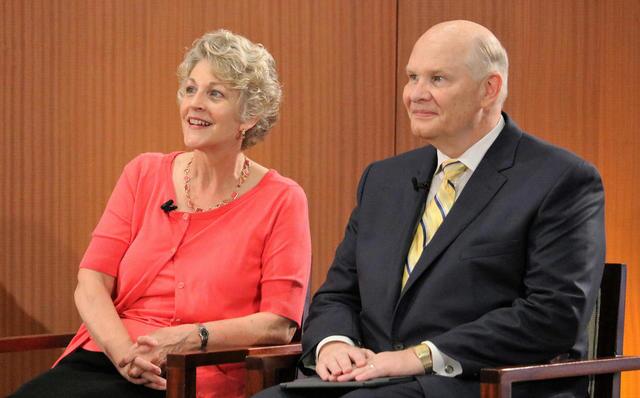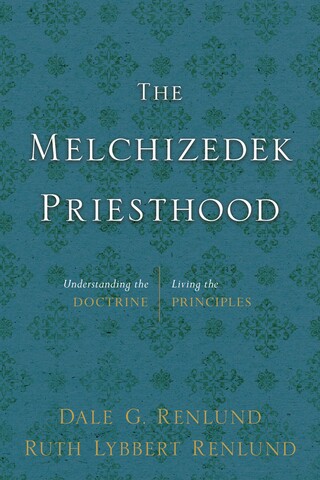The following is an excerpt from Elder and Sister Renlund’s book The Melchizedek Priesthood: Understanding the Doctrine, Living the Principles. In the book, the Renlunds defines the priesthood as follows: “The term priesthood is used in at least two ways. First, priesthood is the term used to describe the total power and authority of God. Second, priesthood is also the term used to describe the power and authority that God gives to ordained priesthood holders on earth to act in all things necessary for the salvation of God’s children. … Thus, the same word, priesthood, refers both to God’s total power and authority and to that portion of His power and authority that He delegates to man on earth.”
Heavenly Father through the priesthood offers His eternal promises to each of His children. All have equal access in the end to His love, power, blessings, salvation, and exaltation. In that regard, God is no respecter of persons (seeActs 10:34;Doctrine and Covenants 38:16; Moroni 8:12; Doctrine and Covenants 1:35). As quoted partially in the Church’s official statement, Nephi said:
“For he [the Lord] doeth that which is good among the children of men; and he doeth nothing save it be plain unto the children of men; and he inviteth them all to come unto him and partake of his goodness; and he denieth none that come unto him, black and white, bond and free, male and female; and he remembereth the heathen; and all are alike unto God, both Jew and Gentile” (2 Nephi 26:33).
Some criticize the Church today because women are not ordained to the priesthood and therefore do not “hold” the priesthood. How can this disparate treatment of men and women be reconciled? Again, we really do not have a complete understanding; however, women in the Church frequently exercise priesthood power and authority, though they are not ordained to priesthood offices.
Consider four ways in which this is so.
Women Have Priesthood Authority in Callings
First, through a setting apart by an authorized priesthood holder, women have priesthood authority to use in their callings in their wards and branches throughout the Church. They have all the authority they need to fulfill their callings and stewardships. What authority do they have? As Elder Dallin H. Oaks taught:
We are not accustomed to speaking of women having the authority of the priesthood in their Church callings, but what other authority can it be? When a woman . . . is set apart to preach the gospel as a full-time missionary, she is given priesthood authority to perform a priesthood function. The same is true when a woman is set apart to function as an officer or teacher in a Church organization under the direction of one who holds the keys of the priesthood. Whoever functions in an office or calling received from one who holds priesthood keys exercises priesthood authority in performing her or his assigned duties.
► You'll also like: 5 Ways Women Are Already Given Priesthood Authority and Officiate in Priesthood Ordinances in the Church
Women Have Priesthood Power Through Covenants
Second, women gain access to the power and blessings of God through receiving priesthood ordinances and making covenants. Power comes from making and keeping baptismal covenants. Power comes from receiving the Holy Ghost. Power comes from making and keeping temple covenants. The power of godliness is thereby manifest in women’s lives (see Doctrine and Covenants 84:20–21). As Elder Neil L. Andersen said, “The blessings of the priesthood are infinitely greater than the one who is asked to administer the gift.” LDS women who diligently make and keep covenants experience priesthood power in their lives.
Women Receive the Blessings of Heaven
Third, faithful women invite the blessings of heaven independent of priesthood ordination. The blessings of God’s total priesthood power and authority are available to LDS women throughout the world. When miracles occur in a woman’s life in the absence of conferred priesthood, she has complied with conditions to be blessed by God’s total priesthood power and authority. Women tap into God’s priesthood power and authority through faith and prayer. Women who pray and act in faith have regular access to God’s priesthood power and authority. President Russell M. Nelson issued a plea to the women of the Church to be the kind of women “who know how to make important things happen by their faith” and “who know how to call upon the powers of heaven.” Women throughout the Church “speak with the power and authority of God” and demonstrate their faith by accepting and magnifying callings, serving missions, raising children, praying for guidance, and acting on the impressions from the Holy Ghost. Their faith gives them access to the powers of heaven to resist temptations, act in charity and goodness, build families, improve communities, and establish the Church.
This third way is complementary to, and not a substitute for, blessings received through conferred priesthood authority. It is not an “alternative” pathway to priesthood blessings to be used instead of those that are accessed through conferred priesthood.
Women Can Become like God
Fourth, a woman participates in the fullness of the Melchizedek Priesthood through temple sealing to a worthy Melchizedek Priesthood holder. Exaltation and eternal life in the highest degree of the celestial kingdom are achieved only as the fulness of the priesthood is attained through building and achieving an eternal marriage. The highest intellectual and spiritual development of both men and women is to become as God is. Becoming as God cannot be achieved by men alone or women alone. Only through the sealing ordinances of the holy Melchizedek Priesthood, performed in the temple of the Lord and ratified by the Holy Spirit of Promise, and through faithful, righteous living can a man and a woman join in an eternal marriage unit wherein they may attain a fulness of the priesthood and exaltation together (see Doctrine and Covenants 132:18–19). All blessings, benefits, and inheritances of the Melchizedek Priesthood are equally shared and achieved by husband and wife if they keep their covenants and live in love, harmony, and cooperation in the Lord.
“Then shall they be gods, because they have no end; therefore shall they be from everlasting to everlasting, because they continue; then shall they be above all, because all things are subject unto them. Then shall they be gods, because they have all power, and the angels are subject unto them” (Doctrine and Covenants 132:19–20).
God offers to all His daughters multiple opportunities to have the fullness of His priesthood and to receive eternal power and blessings. This is where equality really matters. For some, the questions surrounding why God directs that only men are ordained to priesthood offices may be all-consuming. They may feel that for God not to be a “respecter of persons” He must delegate tasks equally. However, participating in eternal equality before God is infinitely more important than being equally delegated earthly tasks.
Even with this understanding, some may still find the issue of women and priesthood ordination troubling. But the time will come when those who remain faithful to the restored gospel of Jesus Christ despite their concerns will be blessed beyond measure. In the Lord’s own time and in His own way, we will gain a clear understanding of His purposes. When that happens, we will all recognize that God has treated us with greater fairness, mercy, and compassion than we deserve or could have imagined.
The Melchizedek Priesthood
This insightful book by Elder Dale G. and Sister Ruth Lybbert Renlund helps men better understand the principles and doctrine of the Melchizedek Priesthood and learn how to properly exercise it in their daily lives. Section one presents the foundations of the priesthood, explaining basics about what it is, what it is for, and the commandments that govern its use. Section two gives fifteen principles that act as a "primer" for using the priesthood more effectively. Elder and Sister Renlund's joint quest in studying the priesthood and its application offers a model for how men and women can work together in their understanding and teaching about the priesthood.


